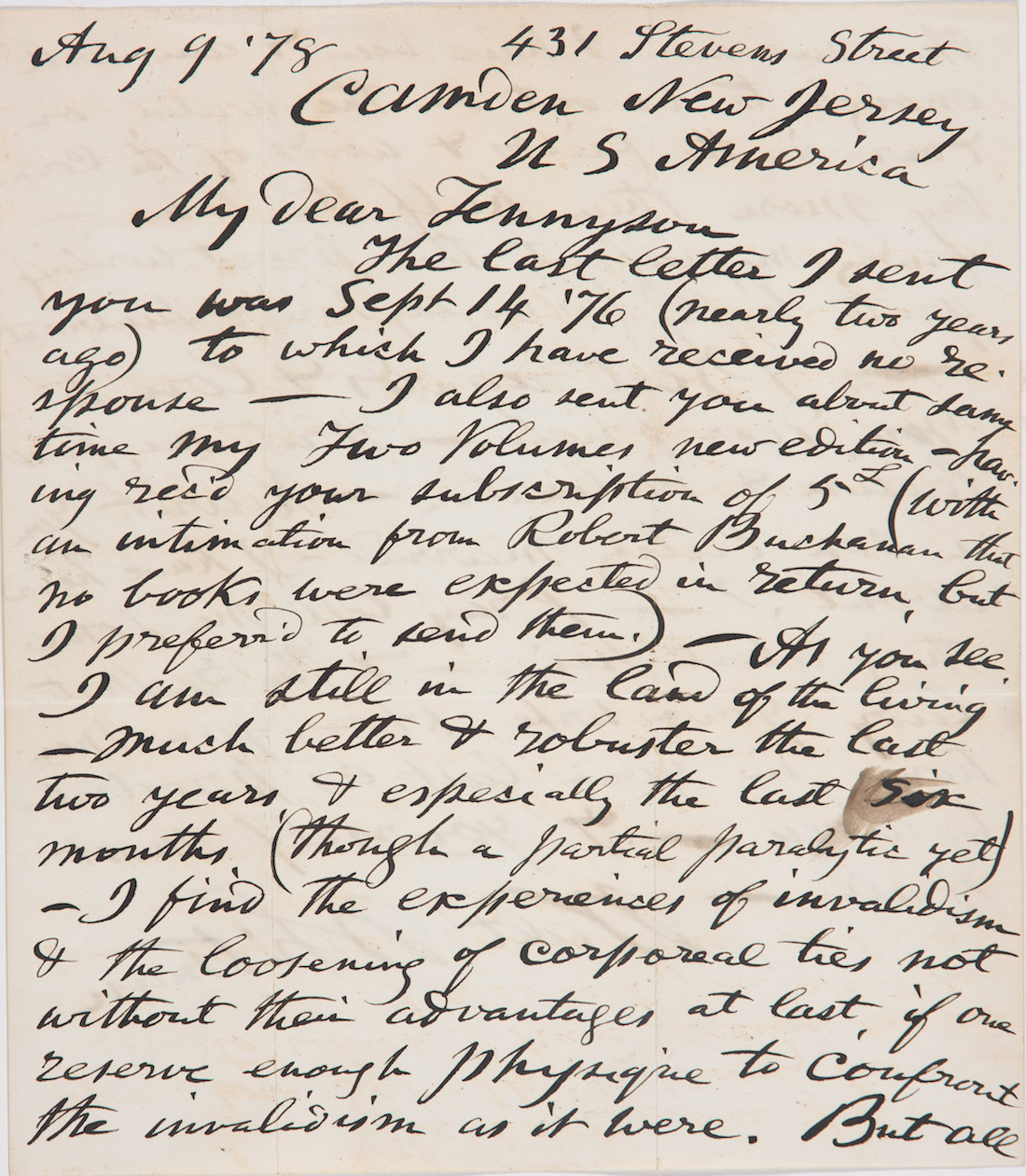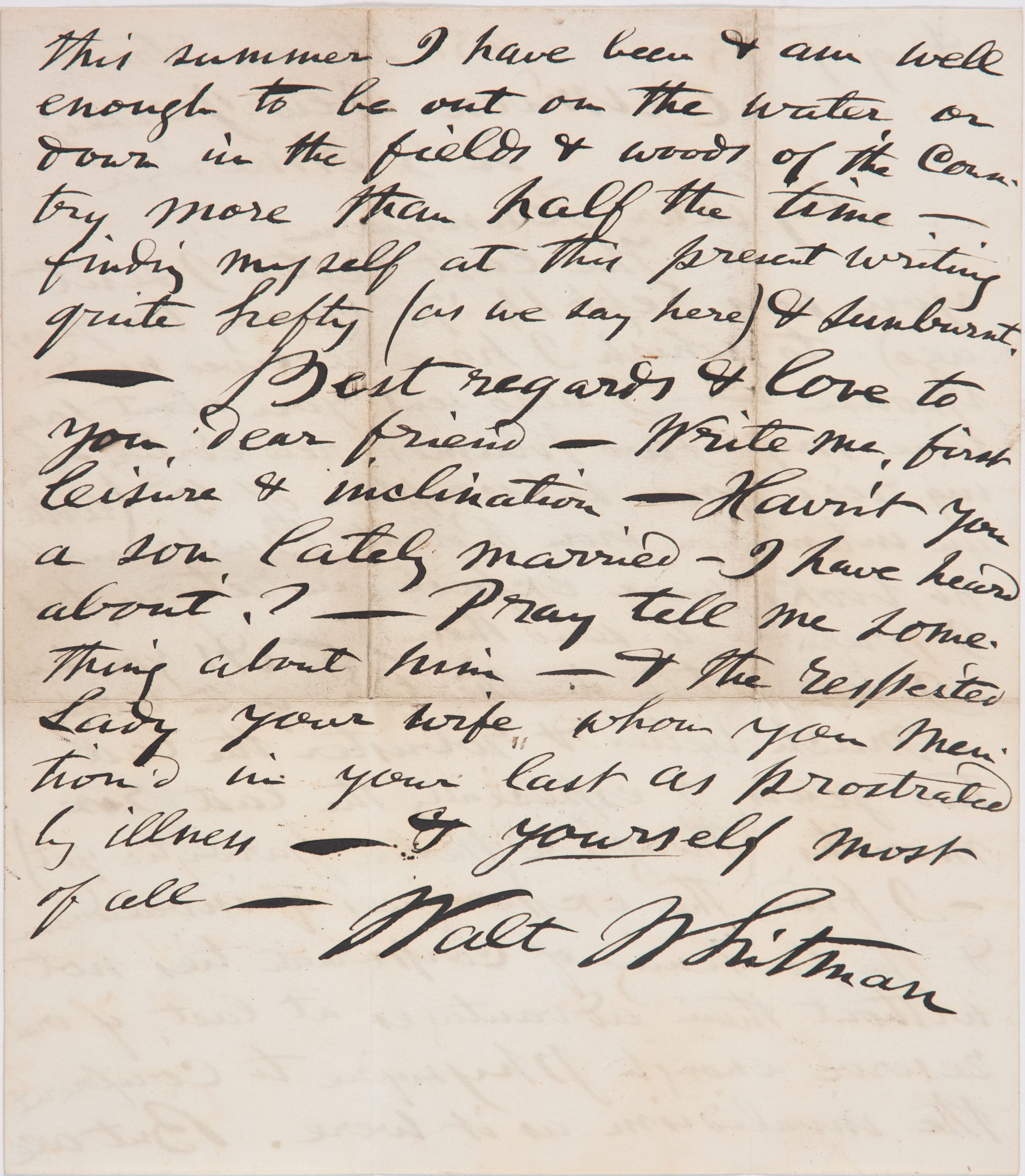Autograph letter signed to Alfred, Lord Tennyson
WHITMAN, WALT. Autograph letter signed to Alfred, Lord Tennyson
Camden, New Jersey, 9 August 1878
Two pages on a single leaf (7 7/8 x 7 in.). Original folds. Boldly penned in dark ink, with a large signature.
“The Good Gray Poet” to the Poet Laureate. Tennyson was the most important of of the many English literary figures who subscribed to the “Author’s Edition” of Leaves of Grass, privately issued by Whitman in 1876. Hearing that Whitman was “in great straits, almost starving,” Tennyson sent him five pounds virtually as an outright gift, rather than the more modest subscription price (Kaplan, Walt Whitman).
In this tremendous letter Whitman approaches the celebrated Tennyson as an equal, writing: “The last letter I sent you was Sept 14 ’76 … to which I have received no response — I also sent you about same time my Two Volumes new edition [Leaves of Grass and Two Rivulets] — having rec’d your subscription of 5 [pounds] (with an intimation from Robert Buchanan that no books were expected in return, but I preferr’d to send them.)”
Whitman goes on to discuss his improved health and enjoyment of the outdoors: “As you see, I am still in the land of the living — much better & robuster the last two years, & especially the last six months, (though a partial paralytic yet) — I find the experience of invalidism & the loosening of corporeal ties not without their advantages at last, if one reserve enough physique to confront the invalidism as it were. But all this summer I have been & am well enough to be out on the water or down in the fields & woods of the country more than half the time… Best regards & love to you, dear friend — Write me, first leisure & inclination …”
Whitman and Tennyson differed dramatically in their views on poetry, but “Whitman highly respected Tennyson as a man, defending his character as warm and ‘worthy of any man’s regard and respect’ and valuing his letters so much that he carried them in the inside pocket of his gray coat” (Sanfilip, Walt Whitman Encyclopedia).
In 1855 Whitman published an anonymous review comparing his own Leaves of Grass with Tennyson’s Maud and other poems. “In the review, he casts himself as the spokesman of a newer, more dynamic civilization that questions the validity of following the old models of poetic form represented by Tennyson. He linked Tennyson with Shakespeare as a poet of the old school, describing him as a ‘bard of ennui and of the aristocracy,’ a writer strictly for the English upper class and not America’s democratized common man. … In his later years, Whitman believed that, although Tennyson had accepted him as an equal, he may not have really understood his character or the intentions of Leaves of Grass—that Tennyson still considered his work decadent, but only as a result of the literary tastes and inclinations of his time” (Sanfilip).
Late in life “Whitman was pleased to be told by British visitors that he looked like Tennyson” (Allen). The poets both died in 1892, bringing to a close one of the great ages of poetry in the English language.
This fine letter linking the age’s foremost poets is the most physically striking Whitman letter we have ever encountered. A draft at the University of Texas shows that Whitman went to great pains to compose the letter. He then determined to write the final text clearly and boldly to show his English counterpart that he was still a man of energy and vitality.
Provenance: “Papers of Alfred Lord Tennyson,” Sotheby’s, London, 22 July 1980, lot 457.
$60,000




